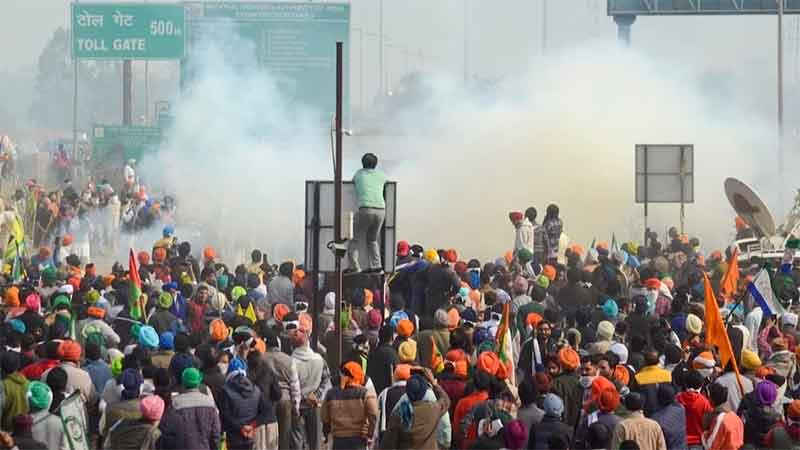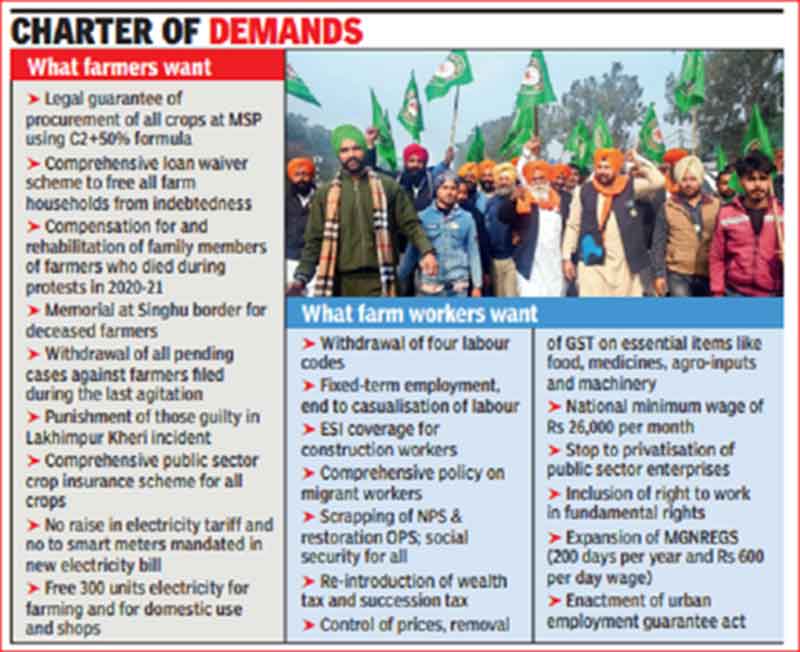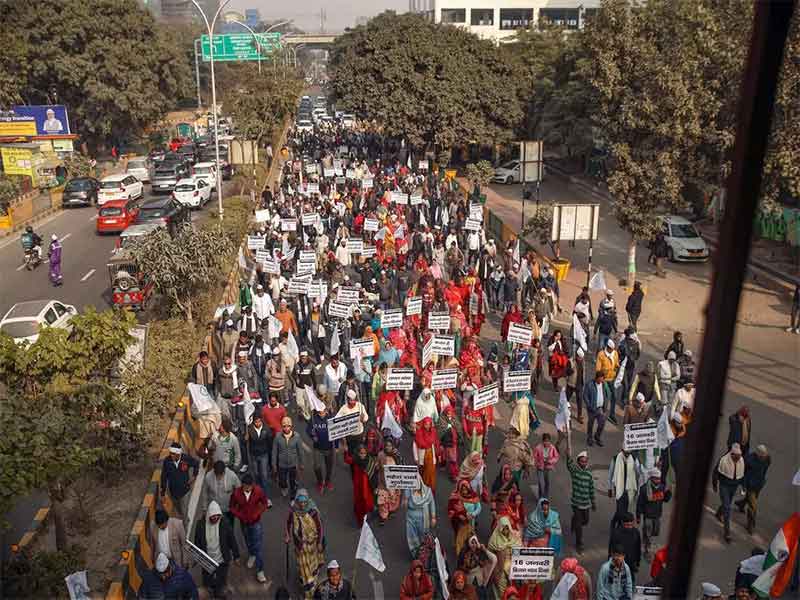
The three farmer laws, that were once named “reform package,” will go out of statute book through a cabinet resolution and a bill to repeal in Parliament, as promised by Prime Minister Narendra Modi. That should have been the end of agitation. The best course for the farmers leaders is to go to negotiation table and press for real reforms which provide for legally binding minimum support price (MSP).
The Samyukt Kisan Morcha (SKM), an umbrella body of 40 farm unions, has decided to continue with Lucknow Mahapanchayat, a tractor march on November 29 and other rallies as planned. It is demanding discussions on the MSP, cases registered against farmers and compensation for deceased farmers’ kin. The body had earlier said their agitation was not just against the repeal of the three black laws but also for a statutory guarantee to remunerative prices for all agricultural produce.
All the three were introduced through the ordinance route as if there was great urgency to help farmers. The details of three laws are:
First, the Central government amended the Essential Commodities Act to remove the existing restrictions on stocking food produce;
secondly, it introduced a new law — The Farmers’ Produce Trade and Commerce (Promotion and Facilitation) Ordinance, 2020 or the FPTC Ordinance — to end the monopoly of the Agricultural Produce Market Committees (APMC) and allow anyone to purchase and sell agricultural produce;
thirdly, another law — The Farmers (Empowerment and Protection) Agreement on Price Assurance and Farm Services Ordinance, 2020 or FAPAFS — was enacted to legalise contract farming, so that big businesses and companies can cultivate vast swaths of land on contract.
In a masterly action and strategic step, Prime Minister chose Gurnanak birth anniversary to please the farmers by promising to withdraw all the three anti-farmer laws. It’s a great step of the BJP leader.
The government and BJP leaders have strongly argued that these laws were reforms similar to the 1991-opening of the Indian economy linking it with the globalised markets. They further said the three laws would open up new opportunities for the farmers so that they can earn more from their farm produce. The government contended that the new laws would help strengthen basic farm sector infrastructure through greater private investments. Successive governments have found financial constraints in investing in farm and rural infrastructure.
It is argued that with food markets growing exponentially in India, private players would make agriculture profitable for the farmers. But the practical issues that surrounded farmers and realities are different. The new laws resulted in removing the safeguards, support systems, subsidies and measures to protect the farmers from the exploitative market forces. The sincerity of the intentions was doubted because all of a sudden, the ordinances were promulgated. It made corporates, and their supporters very happy while farming community was left worrying.
The Prime Minister’s announcement was a pleasant surprise. Withdrawal of the laws is a substantial demand of the farmers. But the farmers were, and still are, worried over MSP assurance. They were also wanted to be sure about annulment of the laws. As credibility crisis crept in all political parties, it became difficult for the agitating farmers to believe these laws would go. Because of the elections around in UP and Punjab, they should have not doubted the promise. On the other hand, it is contended that the government also should have ensured the annulment by promulgating an ordinance.
It is a historic fact that more than 700 farmers sacrificed their lives to achieve the abolition of three anti-farmer legislations. The agitating farmers rightly considered Prime Minister’s announcement of withdrawal of three Acts as a tribute to the martyrs of the prolonged agitation. For corona deaths, the Supreme Court compelled the Centre and the States with the mandate of substantial amount as compensation. The Supreme Court on October 4 approved the guidelines on the disbursal of ex-gratia compensation to the families of Covid-19 victims, issuing a number of guidelines. The recommendation of an ex-gratia payment of Rs 50,000 had been accepted by Centre and some states. Why not each farmer gets the equal money at least for each death due to corona?
Agitation is a basic civil right in any democracy which is part of Article 19(1)(a) that guaranteed the freedom of speech and expression. This has saved the farmers and democracy.
Tendering an apology, the Prime Minister said: “I apologise if some farmers did not understand what we wanted to do through the farm laws.” He reiterated: The three farm laws were brought in, especially to support small farmers so that they get more options and better price for their produce. Every farmer in the country and kisan organisations welcomed the farm laws. I thank all of them today……Our intent was pure. But we could not convince some farmers. We tried our best to explain these laws to the farmers. We spoke, we discussed and we tried to convince them. The government was ready to rework these laws. A lot has happened in two years”
He further said that his government was not able to convince farmers, and stressed that a section of them continued opposing even when the government tried to educate and inform them. “We tried our best to explain to farmers. We were even ready to modify the laws, suspend them too. The matter reached the Supreme Court as well.” “One lakh crore have been given to farmers as compensation. Bima and pension too have been provided. There has been direct benefit transfer as well for the farmers,” he added.
Farmers from Haryana, Punjab and some parts of Uttar Pradesh have been camping at Delhi borders for almost a year now. Even after the ‘stay,’ the farmer unions haven’t stepped back from protest sites like Singhu, Tikri and Ghazipur at the Delhi border. The Centre had held 11 rounds of formal dialogues with the farmers, but maintained that the new laws were pro-farmer, though protesters did not agree. Before the farmer laws were withdrawn, 700 farmers lost their lives, which could have been saved had there been no such laws. The murders at Lakhimpuri Kheri were the worst. Varun Gandhi thanked PM for his “large-heartedness” in announcing the decision to repeal the three farm laws, but added “If this decision had been taken earlier, 700 innocent lives would not have been lost,” he said.
The Supreme Court on 17 Nov 2021 appointed Justice Rakesh Kumar Jain, a former Judge of Punjab and Haryana High Court, to monitor the investigation in the Lakhimpur Kheri violence on October 3 wherein 8 persons were killed, including 4 farmers, who were mowed down by the vehicles in the convoy of Ashish Mishra, the son of Union Minister and BJP MP Ajay Kumar Mishra.
The Chief Justice of India, NV Ramana, Justice Surya Kant and Justice Hima Kohli during the hearing of “In Re Violence In Lakhimpur Kheri(UP) Leading To Loss Of Life| WP(Crl) No.426/2021” observed that they included three IPS officers in the Special Investigation Team constituted by the UP Police to investigate the case. “Mr SB Shirodkar, Mr Deepinder Singh and Padmaja Chauhan, these three police officers will be there in SIT and it stands reconstituted. The investigation will be continued by SIT under the monitoring of the learned judge,” the CJI said.
The Bench had expressed dissatisfaction with many aspects of the probe by the Uttar Pradesh Police – dissatisfied with the lack of seriousness, disappointed that the forensic lab reports regarding the video evidence have not yet come and that the mobile phones of all accused have not been seized. The bench had expressed concerns about the case against the prime accused in the case relating to attack on farmers being diluted by clubbing the investigation with the counter-case of mob lynching. There is a strong need for initiating affirmative and supportive actions for the financial stability of farmers, one of which is the enforceable policy for minimum support price.
***
Courtesy: Hans News Service , 23 Nov 2021
Author Dr. Madabhushi Sridhar Acharyulu was a Professor at Nalsar University of Law in Hyderabad, former Central Information Commissioner and presently is Dean & Professor, School of Law, Mahindra University, Hyderabad.
Email:[email protected]















































